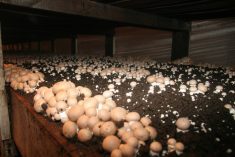WINNIPEG — A majority of Canadians believe that the country takes in too many temporary foreign workers.
In an Angus Reid poll released last week, 56 percent of respondents said Canada brings in “way too many” or “too many” temporary foreign workers.
When broken down by political affiliation, supporters of the federal Conservative party are particularly hostile to foreign workers.
Read Also

Rising vegetable oil demand may offset bad biofuel news
Global biodiesel/renewable diesel production is expected to decline for the first time in a decade. Bad timing for a canola industry looking for new markets.
About 72 percent of respondents who vote Conservative said Canada takes in “way too many” or “too many” temporary foreign workers.
“For their part, would-be Conservative voters are most supportive of eliminating the (TFW) program entirely, but half would still keep it in either the reduced form or as it has been for the past two years,” says an Angus Reid summary of the survey.
More broadly, Canadians told Angus Reid that temporary foreign workers contribute to the housing shortage and harm the job market for domestic workers.
The negative perceptions of temporary foreign workers is a huge problem for the agriculture and agri-food companies. Farmers and agri-food businesses depend on them to fill thousands of vacant positions at hog barns, mushroom farms, beekeeping operations, meat processing plants and many other jobs across the country.
Lauren Martin, senior director of government relations and policy at the Canadian Meat Council, wasn’t surprised by the Angus Reid survey.
It’s reflective of a much larger issue, in which Canadians don’t comprehend the labour shortage in agriculture, food processing and other sectors of the economy.
“The idea of a temporary foreign worker is not well understood, nor is the way we use TFWs,” Martin said from her office in Ottawa.
“There are so many layers of misunderstanding, with so few voices willing to talk about the labour crisis that we are facing in this country.”
Explaining that crisis, Martin repeated something that former Bank of Canada governor Stephen Poloz said a couple of years ago.
The baby boom following the Second World War created an era in which a massive number of people entered the labour market in the late 1960s and the 1970s. Those millions of people provided businesses, including farmers, with a consistent supply of full-time and part-time employees.
“Now that baby boomers are retiring, in huge numbers, the period of abundant labour is over,” Poloz said.
“(We’re) returning to a world where workers are in relatively short supply.”
Martin shared a similar message.
“I’d characterize it as a demographic reality. We’re not producing enough children to replace the individuals who are retiring.”
To fill the demographic gap, companies need people from other countries to work in construction, at meat plants and on farms and do all the jobs that domestic workers find unappealing.
The Temporary Foreign Worker Program isn’t a logical solution for some industries, including meat packers, who employ people 12 months per year and need permanent workers — not temporary.
However, hundreds of agri-businesses use the program because other methods of attracting workers do not produce results.
The public’s hostility toward temporary foreign workers is a symptom of a much larger issue that isn’t going away, Martin said.
The country will continue to rely on people from other parts of the world to fill vacancies in certain occupations because Canadians don’t want those jobs.
“The fundamental roots of the problem are not the Temporary Foreign Worker Program,” Martin said.
“This is a major issue that needs to be resolved … (because) the labour needs are not being met. We need some vision and policy to correct the larger issue around labour.”
















